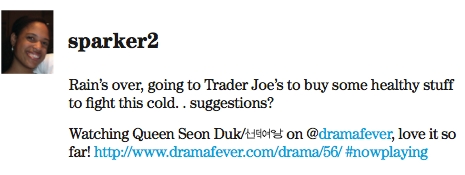2a Move between social and academic writing.
Social connections today involve so much writing—text messages, tweets, Facebook posts, blogs, YouTube videos, and the like—that you probably do more writing out of class than in class. In fact, Web 2.0 and social networking have opened doors for writers like never before. Writing on social networking sites allows writers to get almost instant feedback, and anticipating responses from an audience often has the effect of making online writers very savvy: they know the importance of analyzing the audience and of using an appropriate style, level of formality, and tone to suit the online occasion.
As you know, writers on Twitter tell followers what’s going on in short bursts of no more than 140 characters. Here are two representative tweets from the Twitter feed of Stephanie Parker, a college student whose interests include technology and Korean pop culture.

In these tweets, Stephanie shows a keen awareness both of her audiences on Twitter and of two very common purposes for this kind of informal writing—to seek information (in the first tweet, about foods to fight off a cold) and to share information (in the second tweet, about her view of a Korean drama, with a link so readers can check it out for themselves).

Facebook and similar sites allow for fast-paced conversation between writers. This status update from Alicia Michalski got a response in the form of a link to a YouTube video (of a man exercising to a song called “You Can Do It”), to which Alicia then replied—all in the space of twelve minutes.
Like Stephanie and Alicia, many writers today are adept at informal social writing across a range of genres and media. You may not think very hard about the audience you’ll reach in a tweet or Facebook post, or about your purpose for writing in such spaces, but you are probably more skilled than you give yourself credit for when it comes to making appropriate choices for your informal writing.
Of course, informal writing is not the only writing a student needs to master. You’ll also need to move back and forth between informal social writing and formal academic writing, and to write across a whole range of genres and media. Look closely at your informal writing: What are you assuming about your audience? What is your purpose? How do you achieve a particular tone? In short, why do you write the way you do in these situations? Analyzing the choices you make in a given writing context will help you develop the ability to make good choices in other contexts as well—an ability that will allow you to move between social and academic writing.
Video > Lessons from informal writing